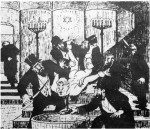In this installment I compare and contrast the morals, morality and moralizing of jews with Whites/Christians. The discussion is focused on two recently published articles in which jews use particularist moralizing, one-sidedly favoring jewish political interests, simultaneously seeking to exploit the universalist morality of Whites while trumping it.
The first article, written by Adam Gregerman, Jewish Scholar in Residence at the Institute for Christian & Jewish Studies in Baltimore, is part of a larger attempt by jews to dictate foreign policy regarding Israel to both the United States government and organized Christianity.
Gregerman’s article, Theology Fail in Christian Statement on Israel, Judaism, Palestine | (A)theologies | Religion Dispatches, published on 29 June 2012, is a critique of “A Call to Action: A U.S. Response to Kairos Palestine”, which Gregerman describes as “a Christian theological critique of the state of Israel and the Jewish religious beliefs that supposedly buttress its policies”.
Gregerman writes (emphasis added):
Most authors are from major Protestant denominations such as the Episcopal, Presbyterian, and United Methodist churches. These Christian traditions have, in a remarkable break with centuries of hateful teachings, opposed both Christian hostility toward Judaism and polemics about Jews’ unfaithfulness to God. They also endorse a two-state solution in the conflict.
In their advocacy for the Palestinian cause, however, the Kairos USA authors have rolled back the clock. In its critique of Israeli policies, the statement troublingly undermines these positive Christian views and takes a zero-sum attitude toward the conflict. Out of a reasonable desire to support the Palestinians, they jeopardize these remarkable interreligious gains by issuing one-sided indictments and by failing to honor Jewish religious and historical perspectives.
The authors’ explicitly religious argument only works in one direction: against Jews and Israel. It’s not criticism itself but this inconsistent application of religious standards that’s problematic.
But the contradictions don’t end there. Jews are also accused both of betraying the good (i.e., universalistic) demands of their own Bible … and of heeding its bad (i.e., particularistic) elements. The authors bemoan traditions in the Hebrew Bible that supposedly evince exclusivism and hostility to outsiders, such as the biblical promise of land that “elevate[s] one people or one race over another.” Likewise, what they call theologies “that privilege one nation with political entitlements to the exclusion of others,” … are to them also unacceptably particularistic. It is therefore wrong to prefer these parts of Scripture, and specifically to neglect universalistic themes about God’s love for all humanity.
In constructing a dichotomy between particularism and universalism, however, they also privilege some biblical themes over others.
Presenting his own one-sided arguments in favor of jews and Israel, Gregerman fails to honor Christian religious and historical perspectives. He blames universalist Christians for creating a conflict with particularist jews, misrepresenting both the source and nature of the conflict.
To illustrate the problems with Israeli policies, the authors gather historical examples of unprecedented brutality as parallels. These extreme examples not only foreclose constructive dialogue but in some cases sever Jews’ connections to their own history. For example, the authors look to antiquity, a time of tragic Jewish subjugation, when Jews suffered under “imperial rule” and faced threats to their “economic survival and physical health.”
Yet they then cast modern Jews as the ones now responsible for such actions. In a stark reversal, Jews are cast as foreign imperialists and persecutors, and Palestinians as persecuted Jews. Rather than simply critiquing Israel’s policies, some of which undoubtedly cause serious harm to Palestinians, the authors read Jews out of their own experiences. Using centuries of murderous oppression of Jews as a model for condemning Israel’s actions is highly disproportionate, as is invoking Jews’ suffering to then use it against them.
Some of the most dreadful acts in human history, including those in which Jews suffered terribly, are adduced as well: “the Crusades, the Spanish Inquisition… genocides and ethnic cleansing.” In these events, the statement notes, people used Scripture to “elevate one people or one race over another,” and “to support conquest and oppression.” It then compares these horrors with Israeli policies, often in identical language.
This is the nut of Gregerman’s moralizing: these confused, uppity Christians have misunderstood the whole point of jews going on and on (as he does) about “jews’ suffering”. Jewish moralizing, both Gregerman’s and in general, is particularist. It is embedded in a narrative that takes “what’s good for the jews” for granted. The moral isn’t about suffering in general, and it certainly is not intended to be used in judging the thoughts or actions of jews themselves. Indeed, Gregerman implies that the real purpose of the constant guilt-tripping about “jews’ suffering” is to “foreclose constructive dialogue”.
The second article, written by Lord Jonathan Sacks, Chief Rabbi of the United Hebrew Congregations of the Commonwealth, is part of a larger attempt by jews to dictate domestic policy in Europe, in this instance concerning a recent court decision to restrict male circumcision in Germany.
Chief Rabbi Lord Sacks: Europe’s New Anti-Semitism, published on 07/11/2012 (emphasis added):
In May 2007 a small group of religious leaders met in the E.U. headquarters in Brussels with the three most significant leaders of Europe: Angela Merkel, German Chancellor and at the time president of the European Council; Jose-Manuel Barroso, president of the European Commission; and Hans-Gert Pöttering, President of the European Parliament.
… Concerned at the return of anti-Semitism to Europe within living memory of the Holocaust, I decided that the time had come to break protocol and speak plainly, even bluntly.
I gave the shortest speech of my life. Sitting directly opposite the three leaders, I said this: “Jews and Europe go back a long way. The experience of Jews in Europe has added several words to the human vocabulary — words like expulsion, public disputation, forced conversion, inquisition, auto-da-fe, blood libel, ghetto and pogrom, without even mentioning the word Holocaust. That is the past. My concern is with the future. Today the Jews of Europe are asking whether there is a future for Jews in Europe, and that should concern you, the leaders of Europe.”
It took less than a minute, and after it there was a shocked silence. We adjourned for lunch, and over it Angela Merkel asked, “What would you like me to do, Chief Rabbi?” I did not have an easy answer for her then. I do now. It is: reverse immediately the decision of the Cologne court that renders Jewish parents who give their son a brit milah, even if performed in hospital by a qualified doctor, liable to prosecution.
It is a measure of jewish political power and influence that professional chauvinists like Sacks have such meetings, the whole purpose of which is to moralize to the supposed “leaders” of Europe about what’s best for jews. Sacks goes on to very clearly distinguish jews from Europeans. He cites a one-sided jewish view of history, describing what he sees as an inborn European imperative to persecute jews, making what is in effect a race-based libel against Europeans:
I have argued for some years that an assault on Jewish life always needs justification by the highest source of authority in the culture at any given age. Throughout the Middle Ages the highest authority in Europe was the Church. Hence anti-Semitism took the form of Christian anti-Judaism.
In the post-enlightenment Europe of the 19th century the highest authority was no longer the Church. Instead it was science. Thus was born racial anti-Semitism, based on two disciplines regarded as science in their day: the “scientific study of race” and the Social Darwinism of Herbert Spencer and Ernst Haeckel. Today we know that both of these were pseudo-sciences, but in their day they were endorsed by some of the leading figures of the age.
Since Hiroshima and the Holocaust, science no longer holds its pristine place as the highest moral authority. Instead, that role is taken by human rights. It follows that any assault on Jewish life — on Jews or Judaism or the Jewish state — must be cast in the language of human rights. Hence the by-now routine accusation that Israel has committed the five cardinal sins against human rights: racism, apartheid, ethnic cleansing, attempted genocide and crimes against humanity. This is not because the people making these accusations seriously believe them — some do, some don’t. It is because this is the only form in which an assault on Jews can be stated today.
Sacks’ is a particularist whose only concern is what’s best for jews. He deems jews exempt from the language and universalist moral authority of “human rights” that he himself uses against Europeans. He interprets this same moralizing, when aimed at jews, as “an assault on jews”, thus revealing his own guilty anti-European mind.
Sacks concludes by telling the German leader (and everyone reading his open letter to her) that in order for Germans to be morally good they must do what jews like himself think is best for jews:
The court’s judgment was tendentious, foolish and has set a dangerous precedent.
In historical context, however, it is far worse. By ruling that religious Jews performing their most ancient sacred ritual are abusing the rights of the child, a German court has just invented a new form of Blood Libel perfectly designed for the 21st century. Chancellor Merkel, the answer to your question, “What would you like me to do?” is simple. Ensure that this ruling is overturned, for the sake of religious freedom and the moral reputation of Germany.
The podcast will be broadcast and available for download on Tuesday at 9PM ET.
Podcast: Play in new window | Download
















